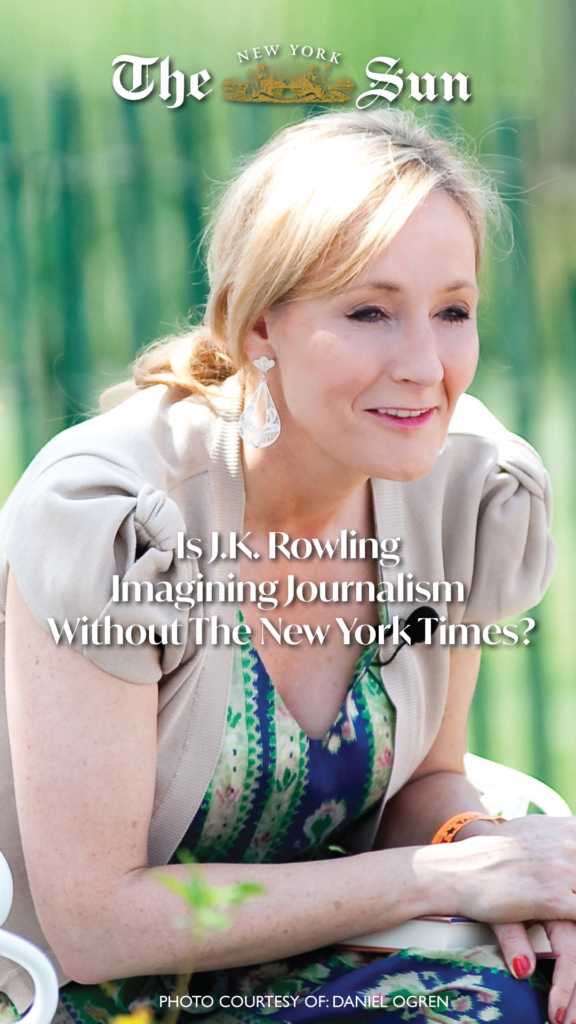Imagine: Harry Potter and the Shining of the Sun
The Times’s effort to cancel Ms. Rowling is a symptom of a streak of censoriousness in our press to deplatform viewpoints that run afoul of the liberal enforcers.

Just as we were sitting down to tap out an editorial for the relaunch today of The New York Sun, a mystery erupted at the New York Times. Call it “Harry Potter and the Petulant Publisher.” It involves the Gray Lady looking down her nose and issuing — yet again — a snort of derision at one of the Deplorables, in this case the author of the Harry Potter novels, J.K. Rowling.
By the sheer force of her imagination, Ms. Rowling has brought joy to hundreds of millions of young readers worldwide. Yet the Times has issued an advertisement that portrays a young Times reader named Lianna. In one image, the bespectacled Lianna is shown looking off into the distance alongside a message from the cancel culture: “Lianna is Imagining Harry Potter Without Its Creator.”
This is a reference to a June, 2020, Times dispatch about how some Harry Potter admirers are upset by the views of Ms. Rowling on transgender matters. This editorial isn’t intended to sort out those questions. It is intended to draw a distinction between the way the Times approaches the news and the way the The New York Sun will be approaching our beat. The Times shines for some. The Sun aspires to shine for all.
We aspire to shine for the Liannas and the J.K. Rowlings. And for, say, the Hasidic teen who tries to imagine the New York Times without its publisher. Or the truck driver in the MAGA hat who drives across the country to honk in protest of the nanny state. Or the Orthodox women in Brooklyn whose laws of modesty forbid them to swim in a pool with members of the opposite sex. Remember?
The Sun will seek to shine for the retirees in, say, Arizona, who are watching their life savings evaporate in the heat of an inflation calculated to benefit big government. Or the doughty Britons trying to escape a European superstate. Or the Free Chinese seeking to avoid conquest by a communistic tyranny. Or the New Yorkers of all races betrayed by law enforcement that has gone soft on crime in our streets, subways, and stores.
Not that we define ourselves in terms of the Times. We do see the Gray Lady’s effort to cancel Ms. Rowling as a symptom of a streak of censoriousness in our press to deplatform viewpoints that run afoul of the “liberal” enforcers. We sympathize with Ms. Rowling. She’s one of the most astonishing writers in history. Her popularity arises from her ability to connect with — and even enchant — millions of readers.
Why would any newspaper suggest its readers dream of Harry Potter without her? Why not cover her views in a fair way? No doubt it’s the tendency among today’s left. The Times itself boasted in 2016 of casting aside objectivity during its coverage of President Trump’s campaign. “If you view a Trump presidency as something that is potentially dangerous,” its media columnist wrote, “then your reporting is going to reflect that.”
That impulse was seen in 2020 when the press and allied social media sought to censor the scoops being brought in by the New York Post on the materials found on a computer that belonged to President Biden’s son Hunter. Reporting was stifled on the claims by the social media censors that the story was “misinformation.” That’s the same word the Times used to describe Ms. Rowling’s views that upset Lianna.
The year 2020 was also when the Times fired its own editorial page editor, James Bennet, for printing a freelance op-ed by a United States senator who called for the use of military force to quell the violence in urban streets amid the Black Lives Matter protests that summer. That violence — some of it featuring incendiary devices and often under-reported — was in many cases worse than the Capitol Hill protests on January 6.
We recognize the Sun is an improbable venture. Our modest staff is surrounded by Goliaths. Yet we rather like our trusty slingshot. We cherish the scales of justice and the Phrygian cap adorning our logo. We savor being back in the fray, hearing from readers, sources, and subscribers. We once visited in Edinburgh the cafe where J.K. Rowling imagined Harry Potter and reminded us all that great stories can take surprising turns.


